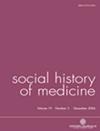丈夫,为了她忍受这一切":分娩中的荷兰男性,1900-1940 年
IF 0.7
2区 哲学
Q1 HISTORY
引用次数: 0
摘要
摘要 我认为,在二十世纪初的荷兰,父亲经常参加孩子的出生仪式,而且这种做法得到了医生的普遍认可甚至鼓励。我的研究结果与有关盎格鲁-撒克逊国家的现有史料形成了鲜明对比,在盎格鲁-撒克逊国家,父亲通常不会出席孩子的出生仪式。我通过当时荷兰社会的和谐家庭理想来解释荷兰与盎格鲁-撒克逊国家之间的这种差异。我展示了出生是如何被视为家庭大事的,父亲应该在其中投入情感。男性必须谨慎处理这种情感参与:他们必须表现出情绪,但又不能失去对这些情绪的控制。我的研究结果表明,我们需要对医生主导的分娩进行研究,以充分了解荷兰医院分娩的缓慢增长。本文章由计算机程序翻译,如有差异,请以英文原文为准。
‘The Husband, For Whom She Endures All This’: Dutch Men in Childbirth, 1900–1940
Summary I argue that in the early twentieth-century Netherlands, fathers regularly attended the birth of their children, and that this attendance was generally accepted or even encouraged by doctors. My findings contrast with existing historiography on the Anglo-Saxon countries, where, at the time, fathers were usually not present at births. I explain this difference between the Netherlands and the Anglo-Saxon countries through the ideal of the harmonious family that permeated Dutch society at the time. I show how birth was seen as a family event, in which the father should be emotionally involved. Men had to manage this emotional involvement carefully: they had to display emotions without losing control of these emotions. My findings show that we need to study doctor-led births in order to fully understand the slow rise of hospital births in the Netherlands.
求助全文
通过发布文献求助,成功后即可免费获取论文全文。
去求助
来源期刊

Social History of Medicine
社会科学-科学史与科学哲学
CiteScore
1.60
自引率
0.00%
发文量
63
审稿时长
>12 weeks
期刊介绍:
Social History of Medicine , the journal of the Society for the Social History of Medicine, is concerned with all aspects of health, illness, and medical treatment in the past. It is committed to publishing work on the social history of medicine from a variety of disciplines. The journal offers its readers substantive and lively articles on a variety of themes, critical assessments of archives and sources, conference reports, up-to-date information on research in progress, a discussion point on topics of current controversy and concern, review articles, and wide-ranging book reviews.
 求助内容:
求助内容: 应助结果提醒方式:
应助结果提醒方式:


